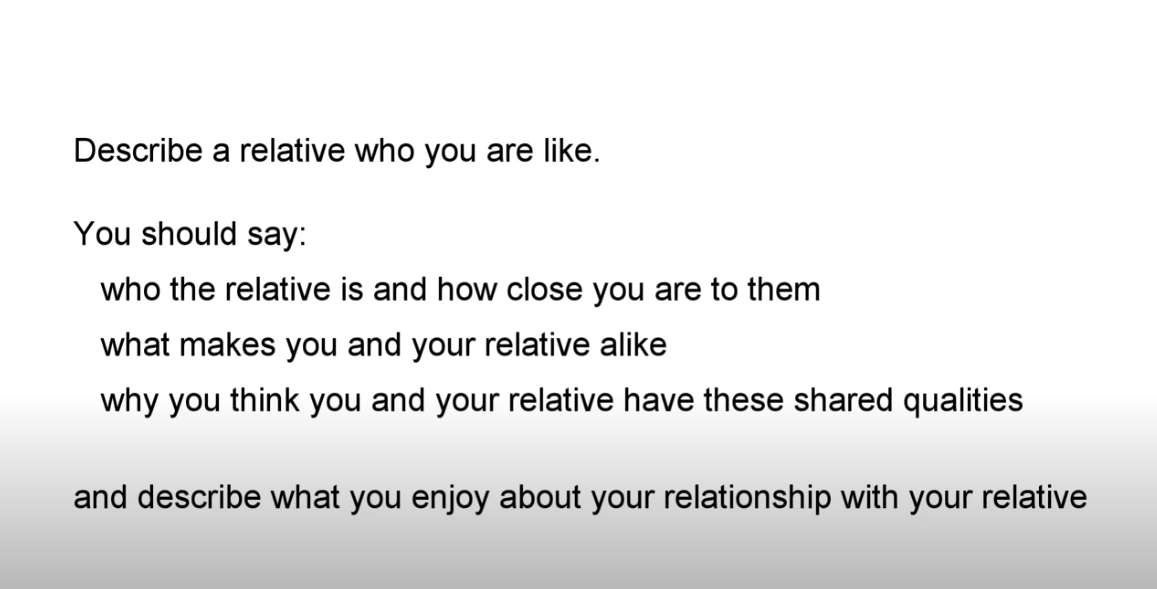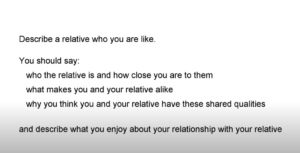IELTSスピーキング・パート 2 の問題例
IELTSのスピーキングは3つのパートに分かれており、パート2では課題に対して2分間のスピーチを行います。自分の経験や過去のエピソードについて話す話題が多く、通常では日常的な内容について取り上げられます。1分間考える時間を設けられますが、それ以上の時間は与えられませんのでご注意ください。
トピックカードを受け取ったら、試験官がストップウォッチで時間を計り始めます。同時にメモと鉛筆も渡されますので自分の言いたいことをまず、思いついた順に箇条書きにしましょう。メモは日本語で取っても英語で取ってもどちらでも構いません。
【トピックカード例】
BUSINESS_TOPIC 1
Describe a skill you want to learn.
You should say:
What it is
• Why you think it is important
• How you are going to learn it
• What role it will play in your future
IELTSパート2のトピックカードに箇条書きで書かれている3~4つの質問はガイドラインと言い、こちらの質問は必ずしも答える必要はありません。また、メモを読みながら回答することができ、試験官の顔を見て話す必要もありません。
【パート2の対策とコツ】
パート2での答え方は、提示されたトピックについて制限時間内ギリギリまでしゃべり続けることが大切です。
途中で試験官に止められても減点にはなりません。しかし、何でもいいからといってただ単に話し続けるのではなく、「内容を具体的に話すこと」が求められます。つまり、内容を具体化しない限り会話も2分間続かないでしょう。
上記の質問例であれば、「コンピュータースキル」のように抽象化せず、コンピュータスキルの何なのかを特定しましょう。
例えば「ワードソフトなどのオフィスの知識」であればそれを具体化します。そうすることで、項目ごとになぜ、が当てはまり考えやすくなるので、内容も漠然とせず具体的になります。
2分間ギリギリまで話せるように日頃からボイスレコーダーなどを使い練習しましょう。2分間ギリギリといっても、1分45秒前後で終わらせても大丈夫です。しかし、1分30秒未満ですと、試験官によってはもっと話せと身振り手振りで合図され話を終わらせてはくれません。
一方で、2分10秒以上では長すぎます。話の焦点がずれていなければいいのですが、違ったトピックに話しが脱線してしまったり、どこで終わるのか予測せず、延々と関係のないことを話しているようでは、減点につながりますので十分注意しましょう。
⚠ スピーキングスコア 6.0
を目指している方は、まずは止まらずに話し続けましょう。ある程度の文法ミステイクは気にしなくても大丈夫です。
⚠ スコア 7.0以上
を目指している方は、話をホーズなく、スラスラと流暢にしゃべり続けること、そして話の一貫性や語彙力が必要になってくるでしょう。
【メモの取り方】
上記の質問例に関するメモの一例です。
メモには文字ではなく記号などを使用しても大丈夫です。具体的であればあるほど好ましいので、なるべく思いつく限り全てのことを書きましょう。常に、なぜなのか、と理由を2つほど考えると具体的にお話できます。
| Cooking skills 1, Love trying different cuisines 2, Important bcz save money, invite friends, healthy, x go to restaurants everyday 3, Going a good cooking school cls 🏠 variety of courses offered, Italian first, desert later, 4, Cooking skills_ married_ provide healthy food for my family and children, or my parents. for healthy living. |
【理由】
料理のスキル なぜか? ➡ 様々な料理をトライするのが好き
重要なスキルである なせか? ➡ ホームパーティが開ける、レストランに毎日通うと破産する
🏠の近くの学校に通う なぜか? ➡ 様々なコース、イタリアンを先に、デザートも
どのように役立つか? ➡ 結婚後に家族にもしくは自分に健康的な食事の提供
IELTS スピーキング パート2 の例題と解答例
EVENT
パート2のスクリプトと解答例
Q.1. Describe an event you experienced in which you did not like the music played.
You should say:
What the event was
Where you were What the music was like
And explain why you did not enjoy the music
解答例1:
I am going to talk about a music event I went to with my friend about a year ago .
We love listening to music and regularly exchange CD to get inspired from different musicians.
This particular festival was an annual event and very popular in Tokyo. The ticket was sold out since many popular musicians were supposed to attend. We were very excited and our expectation was very high.
We enjoyed the beginning when several unknown rock bands were playing. However, some old songs were also played.
We are not really fans of traditional Japanese songs that the older generation particularly enjoy.
I thought the songs were boring and not inspiring at all. We ended up leaving halfway through the end.
Even though leaving the place, the songs were played in the event venue through the speakers placed everywhere.
The music lasted for 30 minutes or so. We could look around some exhibits and play games afterwards.
But I still remember the songs and how I felt about them. Now, we can laugh about the experience but at that time,
we were very disappointed for the choice they made for the music in the event.
Q.2. Describe a time when you changed your opinion
You should say:
When it was
What the original opinion was
Why you changed it
And explain how you felt about it
解答例2:
I believe it is very difficult for certain people to change their mind. But I think it’s a lot better than being stuck and being stubborn. I have changed my opinions on numerous occasions, and I would like to share my view about history when I was younger. I believed that learning history was a waste of time. It doesn’t teach us anything, and it simply takes time away from really useful subjects like science and math. But my history teacher opened my eyes to the marvellous world of history when I reached 10th grade. She linked each historical incident to the current situation.
She told us how policymakers and administrators could help navigate a specific situation by reading history or analysing historical data. If we pay attention to history, we can get answers to all questions we have. She has also shed light on our shared Japanese practises and our historical roots. It made me aware that history is not just the past, but our roots. Now, rather than condemn history education, I support the importance of learning history.
Q.3. Describe a short trip you often take but do not like
You should say:
Where you go
When you go there
Why you go there
And explain why you do not like the trip
解答例3:
A short trip that I often and regularly take is a trip to my grandfather’s home. I love to visit my grandparents, and I look forward to it, but I dislike the journey and its activities. I go to a town called Shirahata in Chiba prefecture, which is 5 to 10 minutes away from where I live. I go there every weekend. I stay there for a day. I help my grandparents with banking work, buy groceries and vegetables, and regularly visit the doctors. I also help them pay their bills and clean their home. I take them to the park, and we also visit our place of worship together. I intend to spend quality time with them and help them in their household chores. I enjoy their company a lot. However, I do not like to take these frequent short trips for many reasons. My grandparent’s home is dark and messy, and I feel uncomfortable there.
These trips are very tiring and stressful for me. I am trying to convince them to come and stay with us forever so that I can get rid of these irritating and tedious trips. They are very attached to their home, so they disagree with me.
I want to be with them, but I do not like the experience of going there at all.
Q.4. Describe a time when you got close to wild animals
You should say:
Where you were
What the animals were doing
Who you were with
And what your reaction was
解答例4:
Here I am going to talk about an animal, which I saw for the first time in the wild. I saw a wild fox from a distance . It was an adult fox that had greyish patches on its back. It was very skinny and seemed looking for some food in the ravine. The fox was completely oblivious of my existence. I was in my room and I could not take my eyes off it, because it is very cute and adorable. I am bit concern whether the fox is healthy or not because it was very skinny and small.
There is not many occasions that we can see a wild animal in the city, so I hope the fox can survive without running over by car or any other accident. I sometimes see a wild rabbit there out of my window, too, so I am guessing the fox was hunting these small mammals. I saw the fox not only once, I caught a glimpse of it two or three times when it comes around in the morning and passes through the ravine. I am very pleased to see it looking around food to eat. But I never feed or try to get close to it. I think we should stay away from wild animals and never tried to contact them.
They might charge and become aggressive. I am just happy looking at a wild animal in a natural setting we cannot see so often in the city.
IELTS スピーキング パート2 の練習問題
THINGS
| TOPIC 1 Describe a prize that you received You should say: ・What it was ・When you received it ・What you did for it And explain how you felt about it |
| TOPIC 2 Describe a photograph of you that you like You should say: ・Where it was taken ・When it was taken ・Who took it And explain how you felt about it |
| TOPIC 3 Describe a tradition in your country You should say: ・What it is ・Who take part in it ・What activities there are And how you feel about it |
PLACE
| TOPIC 1 Describe a home that you visited but did not want to live in You should say: ・Where it is ・What it is like ・Why you visited it And explain why you would not like to live there |
| TOPIC 2 Describe a part of a city or town you enjoy spending time in You should say: ・Where it is ・What it is like ・What you do there And explain why you enjoy spending time there |
PERSON
| TOPIC 1 Describe your favorite singer or band You should say: ・Who your favorite singer is ・What his or her personality is ・What kind of style his or her music belongs to And explain why he or she is your favorite singer |
| TOPIC 2 Describe a polite person you know You should say: ・Who he/she is ・How you knew him/her ・What he/she is like And explain why you think he/she is polite |
まとめ
IELTSスピーキングのパート2は2分間のスピーチ形式。1分間の考える時間を有効に使用して具体例を入れて話すようにしましょう。
普段の練習ではボイスレコーダーを使用して自分のスピーチを録音して2分間話せているか、具体的な内容かどうかをチェックしましょう。練習を積めば、2分間がだいたいどれぐらいかが分かってきます。

IELTSパート2スピーキング対策なら



